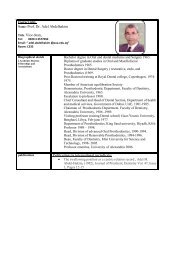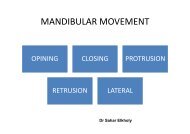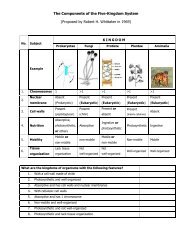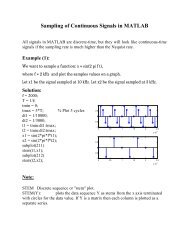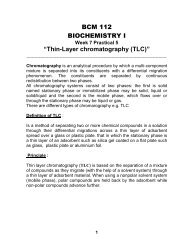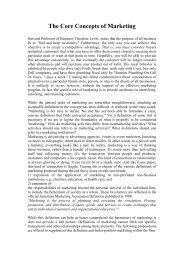E-tourism in England a strategy .pdf
E-tourism in England a strategy .pdf
E-tourism in England a strategy .pdf
Create successful ePaper yourself
Turn your PDF publications into a flip-book with our unique Google optimized e-Paper software.
2. Introduction<br />
Tourism is a major component of the English economy contribut<strong>in</strong>g some £64 billion<br />
annually and represent<strong>in</strong>g one <strong>in</strong> seven of all jobs. It is a vibrant <strong>in</strong>dustry that comprises<br />
some 120,000 bus<strong>in</strong>esses, 90% of which employ ten or fewer people. In common with<br />
other sectors, the <strong>in</strong>dustry needs to take stock of the revolution <strong>in</strong> communication<br />
technologies and must adapt as a result of the emerg<strong>in</strong>g ‘digital economy’.<br />
Some 38% of all UK households are now able to access the Internet from home, with travel<br />
and <strong>tourism</strong> the s<strong>in</strong>gle largest category of products sold electronically. This grow<strong>in</strong>g use of<br />
the Internet provides massive opportunities to reach new markets and to improve bus<strong>in</strong>ess<br />
efficiency. In addition, e-<strong>tourism</strong> can make the <strong>in</strong>dustry stronger and more able to respond<br />
positively to crises such as foot and mouth and the events of 11 September 2001.<br />
The <strong>tourism</strong> <strong>in</strong>dustry is h<strong>in</strong>dered, however, by a lack of jo<strong>in</strong>ed up communication facilities.<br />
The pr<strong>in</strong>cipal challenge is its fragmented nature, reflect<strong>in</strong>g the predom<strong>in</strong>ance of very small<br />
bus<strong>in</strong>esses, mak<strong>in</strong>g communication and consolidation of <strong>in</strong>formation difficult both with<strong>in</strong><br />
the <strong>in</strong>dustry and to consumers. National and Regional Tourist Boards (RTBs), Dest<strong>in</strong>ation<br />
Management Organisations (DMOs) and Tourist Information Centres (TICs) need to harness<br />
new electronic market<strong>in</strong>g opportunities, to make it easier for consumers to purchase the<br />
English <strong>tourism</strong> product.<br />
This <strong>strategy</strong> sets out a framework with<strong>in</strong> which <strong>tourism</strong> <strong>in</strong> <strong>England</strong> can make best use of<br />
new <strong>in</strong>formation and communications technology. In turn, this will enable English <strong>tourism</strong><br />
to realise new opportunities, to provide more effective visitor services and to enhance the<br />
performance and competitiveness of the <strong>in</strong>dustry.<br />
2.1 Context<br />
The English Tourism Council (ETC) is the statutory body charged with develop<strong>in</strong>g English<br />
<strong>tourism</strong>. It is committed to develop<strong>in</strong>g an <strong>in</strong>dustry that strives for high quality, is responsive<br />
to market needs and promotes wise and responsible growth throughout the whole of the<br />
<strong>tourism</strong> <strong>in</strong>dustry.<br />
Given the profile of new electronic media as market<strong>in</strong>g and distribution channels, one of<br />
ETC’s key priorities is to focus on the potential of e-bus<strong>in</strong>ess and to work towards solutions<br />
for the <strong>in</strong>dustry as a whole. This priority fits well with wider Government objectives of<br />
access, adoption of <strong>in</strong>formation and communication technologies (ICT), and support for<br />
small bus<strong>in</strong>ess.<br />
ETC is work<strong>in</strong>g <strong>in</strong> partnership with the RTBs and others to develop <strong>England</strong>Net. This project<br />
is described further <strong>in</strong> section 6 and will create an onl<strong>in</strong>e <strong>tourism</strong> network l<strong>in</strong>k<strong>in</strong>g English<br />
<strong>tourism</strong> regions, dest<strong>in</strong>ation <strong>in</strong>formation systems and new e-bus<strong>in</strong>ess services, to benefit<br />
consumers, <strong>tourism</strong> providers and dest<strong>in</strong>ations.<br />
2.2 The def<strong>in</strong>ition and concept of e-<strong>tourism</strong><br />
The term ‘e-<strong>tourism</strong>’ is used <strong>in</strong> this document to refer to e-bus<strong>in</strong>ess <strong>in</strong> the field of travel and<br />
<strong>tourism</strong> – ie the use of ICT to enable <strong>tourism</strong> providers and dest<strong>in</strong>ations to operate more<br />
efficiently, and to reach and serve consumers more effectively with facilities to search,<br />
compare and book <strong>tourism</strong> products. A more detailed def<strong>in</strong>ition is set out <strong>in</strong> Appendix 1.<br />
7/44 A <strong>strategy</strong> for modernis<strong>in</strong>g English <strong>tourism</strong> through e-bus<strong>in</strong>ess – July 2002



